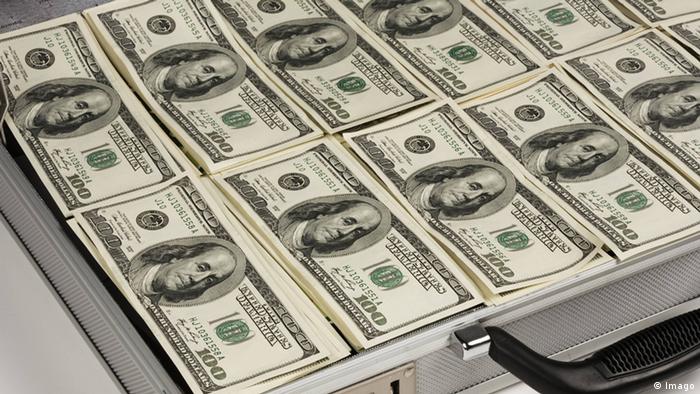Donald Trump bother with the German trade surplus, and sees this as a reason for the US deficits. For Ulrich Kater, chief economist of DekaBank, a sign of the economic and political helplessness.

The US Administration is obsessed with the idea of the bilateral current-account balances. Every country that has a trade deficit with the US is “evil”, be it Germany, China, Mexico, or Canada. Bilateral current account balances, so the trade relations with individual partners, are in a globally networked economy are economically relatively insignificant. Most have about private individuals in a permanent current account deficit compared to the retail trade. Nevertheless, no one would get the idea to levy punitive tariffs on bread until the Baker buys some of its customers. Transferred to national economies, it should not be in a division of labour in the world economy before seeing the target, that trade is balanced between any Pair of countries. Because high balances in one direction or the other can be a win-win condition, if you come by advantages of location and the wishes of the consumers.

Dr. Ulrich Kater, chief economist of the DeKaBank
Something interesting it is to note that the USA recorded with most of its trading partners have a deficit, i.e. an overall economic deficit. You should consider the notoriously high current account deficits of the United States, therefore, from a different angle, have to do with foreign factors, and even with the exchange rates. They are the result of the sum of the low propensity to save: the Americans spend more than they earn. As long as private households, companies and the state produces systematically more goods and services than the US economy itself can overhang of demand through imports from abroad.
Trump makes for even more deficits
The editorial recommends
The IMF, in Berlin: Give more money!
Each year, the world presents monetary Fund recommendations for Germany. Also this time, the experts criticise the surpluses of the high Trade. They require more investment – and there are warnings. (15.05.2017)
IMF Chief urges Germany
This week, the world Bank and the IMF meet for their spring meeting. Careful IMF-Head Christine Lagarde the Finger in the direction of Germany – again, it goes to the current account of the export giant. (18.04.2017)
EU: Germany should spend more money
If Germany invested more and consumed, would benefit the entire Eurozone. To this end, the EU-Commission in a new report. (26.11.2015)
This presents an opportunity for the government to Trump, to correct the negative current account balance. You can take measures to increase Savings in the United States. The US government budget had, in the year 2016, the deficit is still almost five per cent in Relation to gross domestic product. The correction to the half would be enough, mathematically, the current account deficit of the country balance. The government Trump would have to forego, however, the planned economic stimulus program. Because unless it is re-financed deficit, pushing the current account balance even further up and over his economy-stimulating effects also the US Dollar exchange rate. Helpful to the economy would be to program only if it is not aimed at stimulating Demand, but to improve supply-side conditions and competitiveness. The U.S. government would be a key to reducing the current account deficit even in the Hand.
Conversely, in Germany, however, holds the key to his current-account surplus in the own Hand. This Excess is apparently also a little depending on the exchange rate. The reaction of current account balances on exchange rate in Germany was always only a short-term nature. In the D-Mark era, the positive decreased the balance of foreign trade in Appreciation phases is only for a short time, to return later to re-adjust. A slightly more sustainable deficit existed in Germany only in the 1990s, and the strong as the weak D-Mark. Reason for this is the economic program of the German at that time was reunification. After the financial crisis further, the German foreign trade surplus significantly, although the exchange rate of the Euro by 2015 is disproportionately high. Currently, one could even view the weakness of the Euro as a long-term threat, because it pretends to a higher competitiveness. Long-term competitive advantages can only be achieved through increases in efficiency and innovations. A weak currency is euthanising these efforts but rather.

The German savings are invested abroad
The true reason of the German Surplus
Also in Germany there are forces other than the exchange rate, determine the power balance in the long term. If – Vice versa to the United States – the participants of the German economy as a whole much want to save, then a major reason for a Surplus is laid. A low propensity to invest these savings in their own country, then the Surplus is perfect. Both is the case in Germany. In particular, in the case of the latter, the questions must be whether the amount of your Surplus is so ideal. Both trading partners can work on their balances. That the US government will now proceed with area-wide sanctions against the German industry sectors, is unlikely, however, because a protection attack on the German industry is an attack on the European Union. This is as a trading partner larger than the US economy would not be hit by potential sanctions Against sensitive.
But the foreign trade balances and even the goal that the US President is aiming for. The USA have lived for decades with a negative trade balance, which is funded via the reserve currency, the US Dollar easy. Trump has promised his voters, not a balanced current account, but well-paid jobs in a revived industry. This protection, however, is not the right Instrument. In this respect, the by him from the fence broken discussion of the German Surplus is also a testimony to the economic and political helplessness in front of the challenges of the service-based society of tomorrow.
Dr. Ulrich Kater is chief economist of Deka-Bank.